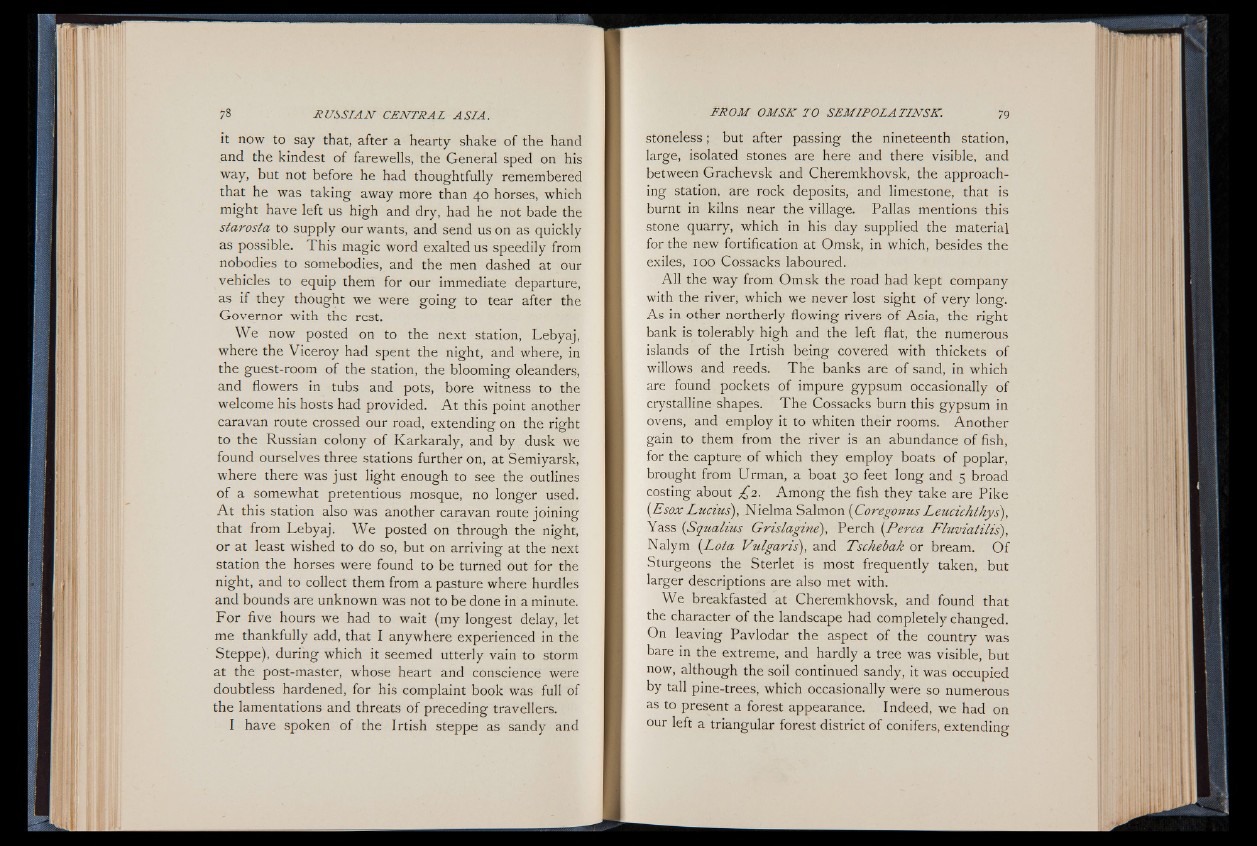
it now to say that, after a hearty shake of the hand
and the kindest of farewells, the General sped on his
way, but not before he had thoughtfully remembered
that he was taking away more than 40 horses, which
might have left us high and dry, had he not bade the
starosta to supply our wants, and send us on as quickly
as possible. This magic word exalted us speedily from
nobodies to somebodies, and the men dashed at our
vehicles to equip them for our immediate departure,
as if they thought we were going to tear after the
Governor with the rest.
We now posted on to the next station, Lebyaj,
where the Viceroy had spent the night, and where, in
the guest-room of the station, the blooming oleanders,
and flowers in tubs and pots, bore witness to the
welcome his hosts had provided. A t this point another
caravan route crossed our road, extending on the right
to the Russian colony of Karkaraly, and by dusk we
found ourselves three stations further on, at Semiyarsk,
where there was just light enough to see the outlines
of a somewhat pretentious mosque, no longer used.
A t this station also was another caravan route joining
that from Lebyaj. We posted on through the night,
or at least wished to do so, but on arriving at the next
station the horses were found to be turned out for the
night, and to collect them from a pasture where hurdles
and bounds are unknown was not to be done in a minute.
For five hours we had to wait (my longest delay, let
me thankfully add, that I anywhere experienced in the
Steppe), during which it seemed utterly vain to storm
at the post-master, whose heart and conscience were
doubtless hardened, for his complaint book was full of
the lamentations and threats of preceding travellers.
I have spoken of the Irtish steppe as sandy and
stoneless; but after passing the nineteenth station,
large, isolated stones are here and there visible, and
between Grachevsk and Cheremkhovsk, the approaching
station, are rock deposits, and limestone, that is
burnt in kilns near the village. Pallas mentions this
stone quarry, which in his day supplied the material
for the new fortification at Omsk, in which, besides the
exiles, 100 Cossacks laboured.
All the way from Omsk the road had kept company
with the river, which we never lost sight of very long.
As in other northerly flowing rivers of Asia, the right
bank is tolerably high and the left flat, the numerous
islands of the Irtish being covered with thickets of
willows and reeds. The banks are of sand, in which
I are found pockets of impure gypsum occasionally of
crystalline shapes. The Cossacks burn this gypsum in
ovens, and employ it to whiten their rooms. Another
gain to them from the river is an abundance of fish, i for the capture of which they employ boats of poplar,
brought from Urman, a boat 30 feet long and 5 broad
costing about £2. Among the fish they take are Pike
[Esox Lucius'), Nielma Salmon (Coregonus Leucichthys),
Yass (Squalius Grislagine), Perch (Perea Fluviatilis),
Nalym (Lota Vulgaris), and Tschebak or bream. O f
Sturgeons the Sterlet is most frequently taken, but
larger descriptions are also met with.
We breakfasted at Cheremkhovsk, and found that
the character of the landscape had completely changed.
On leaving Pavlodar the aspect of the country was
bare in the extreme, and hardly a tree was visible, but
now, although the soil continued sandy, it was occupied
by tall pine-trees, which occasionally were so numerous
as to present a forest appearance. Indeed, we had on
our left a triangular forest district of conifers, extending